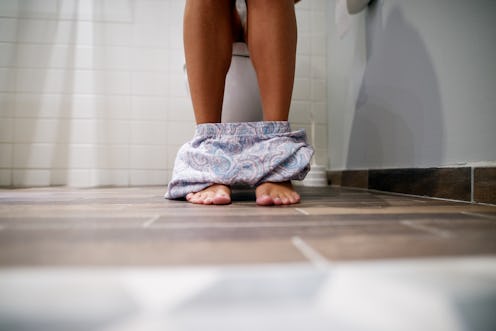Life
Someone Invented A Pregnancy Test You Can Flush Down The Toilet
There go millions of soap opera story lines where a secret pregnancy is revealed by a thoughtlessly discarded urine stick in the trash can. Last Monday, the Food and Drug Administration cleared Lia, the wold's first biodegradable pregnancy test, to be sold over the counter, and it's expected to hit the market by mid-2018. That same day, it also came in first place in a pitch competition at Tech Crunch Disrupt Berlin, winning €42,000. (That's nearly $50,000.) 2017 may have a less than stellar reputation as far as years go, but clearly, it's ending well for Lia Diagnostics.
Unlike traditional pregnancy tests, which are plastic and must be thrown away, Lia is a biodegradable paper test. It can be folded or bent after use, and it disperses in water, making it flushable. The test is, in other words, discreet and environmentally friendly in a way that no other pregnancy test has managed before — without sacrificing accuracy. It may have different packaging, but it still tests for high levels of hCG, the hormone produced by a fertilized egg when it attaches to the uterus. On its website, Lia promises more than 99 percent accuracy, which is on par with its plastic competitors.
According to Tech Crunch, Lia is the brainchild of Bethany Edwards and Anna Simpson, who began working on the idea as graduate students in the University of Pennsylvania's Integrated Product Design program. Edwards explained to Tech Crunch that she was particularly interested in the wastefulness of single-use products, which are often made of non-sustainable materials. Originally, she and her colleagues focused on pregnancy tests out of a desire to be more environmentally friendly, but they soon realized how long it had been since over-the-counter pregnancy tests were updated. Soon after, Lia was born (so to speak).
Lia functions exactly like a traditional pregnancy test: Someone who thinks she might be pregnant pees on a stick, which reacts to the presence of hCG. (By the way, Lia is innovative in more than one way: It's designed to have a larger surface area to catch urine, so it's easy to collect a sample.) One line indicates that the person isn't pregnant; two lines indicate that she is.
The difference is that when someone is done with the test, they can crush it up and flush or compost it. According to the website, it breaks down by more than 98 percent after three months in the soil. "That means more breathing room for the earth, and extra karma points for you!" the website writes.
It also means that women who use it will have more privacy. Regardless of the result they're hoping for, pregnancy is a private matter, and women deserve to keep the information to themselves without worrying that other people will spot the test in the trash.
Lia Diagnostics told Tech Crunch that now that the test has been cleared by the FDA, it hopes to sell the product online via its website and Amazon, beginning sometime in the middle of 2018. Lia won't be cheap, but the creators do plan to sell it at a price somewhere above generic but below the priciest tests.
The company has announced that part of the proceeds from Lia tests will be donated to women's education in the United States and around the world, and it launched a "giving back" campaign encouraging visitors to pledge money. For every $10 pledged, Lia Diagnostics promises to send a pregnancy test to the woman's organization like Planned Parenthood or the International Women's Health Coalition.
Lia's creators don't plan to stop with pregnancy tests. Edward told Tech Crunch that this is "just the start" of more sustainable medical diagnostics. Something tells me Mother Earth would be proud.
